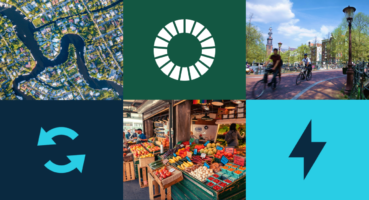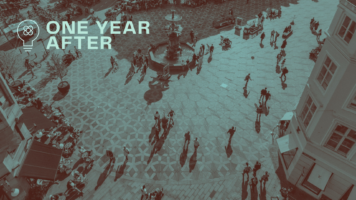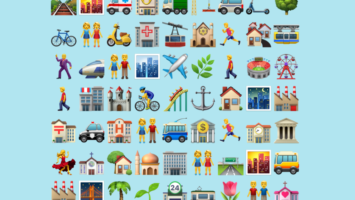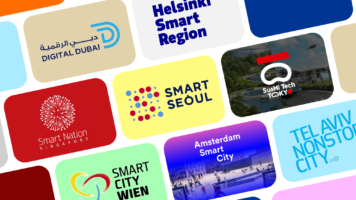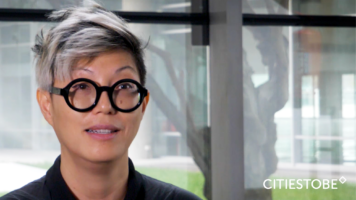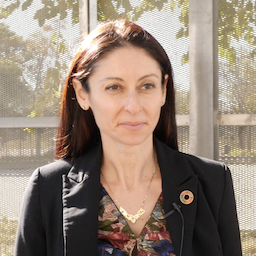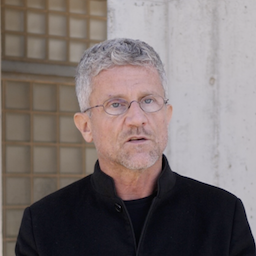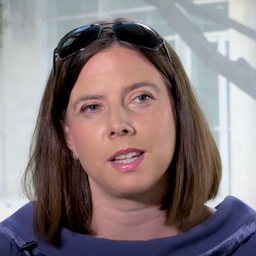What will 2023 bring for cities? Our 10 predictions
By | 2022
The past two years have irrevocably exposed how urban readiness is an imperative if we want to guarantee a thriving future for cities. One in which they can be self-sustaining, technologically advanced and resilient to any potential environmental, digital or social challenges.
As planning ahead is the only way forward, in this article we are bringing you 10 urban trends that, according to our expertise, will set the pace for cities in 2023.
1 | Digital services for all will strengthen cities’ future-readiness
Digitalization is a crucial element in the management of a city: we can build resilient environments even in the toughest situations to guarantee core services and the protection of the people offering them all the information they need, while we transform our towns into future-ready cities. However, the main challenge to address now is to enable technologies without leaving any citizen behind.
City governments are working to deploy sophisticated software, introducing new disruptive technologies such as digital twins, virtual reality or even the Metaverse, but what is important too is to start planning to promote digital services tailored to the socially vulnerable. In any case, we have seen that all the paths come across to the same question: ‘Why didn’t we do it before?’.

2 | Cybersecurity threats will increase due to the digitalization of services
As a result of the digitalization of cities, when talking about city security we must take into consideration the safety in the digital space. Digital surveillance and cybersecurity strategies are now key to overcoming cyber attacks, which have become a more common threat to digital cities and societies: we have experienced and witnessed attacks in different softwares and sectors (governments, healthcare, banking, education), affecting their services and data.
Therefore, personal data is one of the main targets. What control do citizens have over their data? How to ensure data protection? How do governments shield digital public services and protect their citizens? This trend will continue to develop stronger networks and systems to detect any vulnerabilities faster and to secure and ensure data protection.

3 | There will not be safety without affordability
While cities are dealing with ensuring physical and cyber security, another risk must not be forgotten: there is no safety without affordability. Due to the strong link between housing, safety and health, the debate on the provision of quality and affordable housing is at the center of the urban conversation, as is the cost of living in the city in general — which remains a challenge to be addressed.
Inequalities among the population in cities have increased in the last years, and have accentuated in the last months due to the current global energy crisis. As a result, solutions at a local and national level are needed worldwide: beyond complex technologies, bold infrastructure, and ambitious urban planning, affordable living is the only starting point to start building an equitable smart city.

4 | Lifestyle will define how to strike a balance between citizens and visitors
We are living a work-from-home revolution that we have inherited from the pandemic. This paradigm shift is opening up new ways to better combine workload with personal life and the many other facets of our lives.
Giving our priorities a new order also impacts the requirements we ask for to live in our cities: safe places, sustainable environments, digitally transformed services, an affordable way of living. Among many other elements, this phenomenon is defining a new future-ready city, desirable not only for its citizens but also capable to attract talent, business and visitors. Everyone can benefit from all the opportunities that a city offers, but the real challenge for cities in the coming years will be to reformulate urban spaces to adapt them to this new lifestyle. For those of us who inhabit or visit them, the challenge will be to learn to live by sharing these spaces, respecting and protecting them.

5 | Infrastructures will shape cities as social spaces
As a result of the growing urban population, urban agendas are becoming more people-oriented. There is a change in the paradigm to make cities not only of ‘hard infrastructure’ — typically known as bridges, roads, streets — but rather making ‘cities as a whole’. However, to meet the needs of citizens, cities must rethink and invest in their built environment at the same time, which is an ongoing and complex task. What makes a ‘good’ city, then? Cities are turning towards the perception of infrastructure as a service for the inhabitants, with the aim of increasing habitability, efficiency and sustainability.
As a consequence, interdisciplinary approaches to urban design, infrastructures and building are emerging. We have one clear example with the New European Bauhaus, an initiative correlating architects, designers, engineers, artists, etc., to work together towards a common goal: sustainability, inclusivity and livability for the cities we want.

6 | Urban mobility will evolve sustainably
Urban spaces are being redesigned to give more prominence to people. Since the use of public space has changed and there is an increased awareness around sustainability and urban space, the concept of mobility and how people move has evolved. New trends showcase that traditional cars and other gasoline- or diesel-powered vehicles will continue to lead to electric mobility, active and micro mobility, autonomous vehicles, shared mobility, mobility as a service, and the use of public transport.
In other words, how people move is correlated with sustainability. But these trends entail also a shift in urban planning: how are cities adapting to these means of transport? Cities must keep improving infrastructures such as bike lanes, bicycles parkings or charging stations, to list some.
7 | The climate emergency will regain its momentum for good
Up until 2019, global warming and its consequences gained the media momentum that this challenge required in order for decision makers to take a drastic shift towards adaptation and mitigation strategies, ones that could deal with the greatest challenge that our generation will meet. Nonetheless, the urgency of overcoming the pandemic in 2020 and 2021 slowed down this impulse.
2023 will mark the turning point for governments around the world to pick up the reins and effectively engage with other stakeholders to guarantee the climate financing, comprehensive transformation, and action plans required to actively lead an environmentally feasible future.

8 | Coastal cities will embrace the ocean and the Blue Economy
71% of the world’s surface is water, and oceans are offering a new opportunity for economic activity. The Blue Economy has recently been in the spotlight of coastal cities to ensure a sustainable development while preserving the marine ecosystem. Some coastal cities such as Barcelona have already explored the Blue Economy as a vector of economic sustainable opportunities and generated strategies around it — a task that we have supported from Anteverti. It is the way forward for many others.
This new paradigm integrates the endeavours of different stakeholders — and collaboration is key. Sustainability is possible thanks to scientific data and research, civil society engagement, a strong leadership of the public sector and the engagement of the private sector and start-ups, together with innovation and technology. There are already many technological, research and citizen science initiatives and efforts around sustainability, oceans and climate change mitigation. And they prove that we all have a role to play.

9 | Creative cities will be the ones to move forward
Somewhere in the intersection between creativity and collaboration lies the secret to the best initiatives to achieve the cities we want and need.
2023 will prove that the solutions of urban challenges need to be approached collectively, and that a dose of enthusiasm is the key for communities to effectively bring them to action. From urban farms that evolve into greener cities to inventive cuisine initiatives that preserve local culture, creative projects have the potential to be scaled and have a profound impact. Citizens themselves are the best when assessing what needs to be improved, and also the first ones to want to solve issues in the most engaging and lively way.

10 | Effective equity will be considered the bare minimum
The fight for inclusive cities has been fiery and prevalent since urban settings have been a reality. Nevertheless, the last few decades have seen an improvement of, not only equity in cities, but also a normalization on the importance of achieving such fairness.
In 2023, the perception of how inclusive cities are not only desirable but the bare minimum to build smarter cities will strengthen, and we will observe how systemic inequalities among all collectives and citizens become inexcusable.
Being an inclusive city will not be seen as a merit, but rather not attaining this standard will start to be seen as a demerit. This change in the collective perception will consolidate the unstoppable process of tearing down the barriers to equality.
In conclusion: 2023, navigating towards better cities for all
If the future is expected to hold opportunities such as the blue economy, but also potential intensifying issues such as cyber threats, we ought to be ready and help our cities navigate a present that leads us to the forthcoming cities we want.
The prospect that awaits urban settings looks promising just as much as it warns us of what could happen if we don’t urge decision-makers to step forward, so it’s time to take heart and make our part in this coming year. 🔹
Looking for more?
Follow us on Twitter and LinkedIn and subscribe to our Cities To Be newlsetter here: www.citiestobe.com/newsletter
About the authors
Mons Badia is an expert in eco-innovation, sustainable and resilient urban development and creative and cross-cutting urban solutions. She has been working at Anteverti since 2017, where she is a senior specialist of the Smart City Expo World Congress team and content coordinator for Tomorrow.city. She has also developed smart city and smart region strategies as a consultant.
Mons serves as the President of the College of Environmental Scientists of Catalonia, and has previous professional experience working in the United Nations Global Compact, in the Norwegian University of Science and Technology and in the Universitat de Barcelona, as well as in the consulting firm Inèdit.
Mons Badia has a degree in Environmental Sciences and Fine Arts (Universitat de Barcelona), and is currently studying a Master's Degree in Philosophy for Contemporary Challenges (Universitat Oberta de Catalunya).
Mireia Tudurí is an expert in globalization, sustainable development and migrations. She has been working at Anteverti since 2018 as a consultant in the framework of several local projects, advising institutions such as the City Council of Barcelona or the Provincial Council of Barcelona. At the same time, Mireia works as Programme Coordinator of the editions of the Smart City Expo held abroad.
Before joining Anteverti, Mireia worked for the Barcelona Global association, where she collaborated in projects related to the attraction of talent and economic activity in Barcelona - with both an international and local approach -, as well as in communication tasks with the members of the association.
Mireia Tudurí holds a BA in Applied Languages (Universitat Pompeu Fabra and University of Westminster) and a Master in International Relations (IBEI).
Valeria Andrade is a multidisciplinary expert with 8 years of background helping organizations identify the opportunities shaping the cities of the future, managing projects, and organizing international corporate events. Since 2022, Valeria has worked at Anteverti as a senior congress specialist for the Smart City Expo World Congress, and provides support for other events related to urban issues, such as Barcelona ReAct.
Previously, Valeria worked at the association Barcelona Global, where she gained experience in projects focused on mobility, affordable housing, education, public-private partnerships, tourism, and talent attraction. She holds a degree in Political Science with a specialization in international relations, geopolitics, and global governance.








